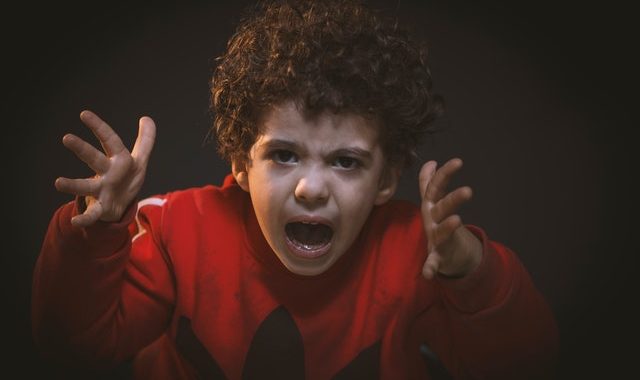It’s easy to recognize that a child hiding behind a parent’s leg, trying to disappear from a friendly stranger’s questions, may be feeling shy and a little anxious at that moment. It’s also pretty widely acknowledged that certain scenarios like public speaking, starting a new school, or going away to camp may create a bit of anxiety for many people. Lots of people think of “anxiety” as shyness or fear and, on some level, seem to understand the temptation people might have to back away or avoid those anxiety triggering experiences. It’s harder, though, to recognize irritability and anger as responses to anxiety.
To understand anxiety, we have to think about cavemen. When cavemen were alive, they could feel relatively safe while they remained sheltered in their caves. When it was time to eat, though, they would have to leave their cave and find food. As they searched for food, they had to be on “high alert,” so that they could quickly recognize a threat and react in a way to help them survive. We refer to this as “fight or flight or freeze.” When we perceive a threat, our brain sends messages to our body that tell us to either fight off the danger, run away from it, or, as I describe it to kids, “freeze, act natural, and hope that saber tooth tiger doesn’t see you, hear you, or smell you.”
Today, we don’t have saber tooth tigers to look out for, but we still have the fight or flight or freeze response that protects us from danger. That’s a good thing! People with anxiety, however, often function as if they are on high alert, or “on the lookout” for danger. They end up perceiving situations as threatening when, in reality, they are not in any actual danger. We talk to kids about these “false alarms” they experience. In response to the false alarms, people with anxiety experience the fight or flight or freeze response. So, they end up lashing out, avoiding or escaping from uncomfortable situations, or they shut down.
For example, if a kid feels anxious about swimming, that lesson they were signed up for feels like a threat. An “alarm” starts going off in that kid’s brain and fight or flight or freeze kicks in. You might see that kid kick and scream, refusing to go with the instructor. You might see that kid hop out of the pool and run away from the instructor. Or, you might see that kid, frozen in the car, refusing to even move, going “boneless” to make it hard for a parent to carry him. When a person is in fight or flight or freeze mode, they can not think very clearly. Any reasoning, bargaining, or explaining is likely to be met with an escalated response (i.e., more kicking and louder screaming).
It isn’t always as simple and obvious as the example above, though, and that makes it hard for people (especially, in my experience, parents and teachers) to recognize that irritability and flashes of anger that seem to come out of the blue can be connected to anxiety. A pretty typical example of this is a kid who feels anxious about their performance. This kid goes to school, feeling uncomfortable and threatened (remember – there is no actual threat, but this is how it is perceived by the person with anxiety) every time she reads aloud in class. She worries about making a mistake or getting in trouble. When the teacher reminds the class to quiet down, this student perceives that she is being yelled at. All day, false alarms are going off in this kid’s brain and she is on edge, but not fighting or obviously escaping or shutting down. She keeps it together. Until, she gets home. That’s when all of the pent up fight responses come out. Her mom asks her how her day was, she snaps back at her. Her brother hums while he eats, she yells at him for being so gross and annoying. And on and on and on.
Because the alarm isn’t going off for the parent and because there isn’t an obvious anxiety triggering event, it just feels like that kid is being rude and difficult and angry. We have to remember, that kid is struggling. Fortunately, there are many effective and empirically supported interventions that can help your child learn how to manage their anxiety. Therapists can and should help parents understand their role in helping their child manage anxiety as well as learn helpful responses to their child’s anxiety and anxious reactions.

